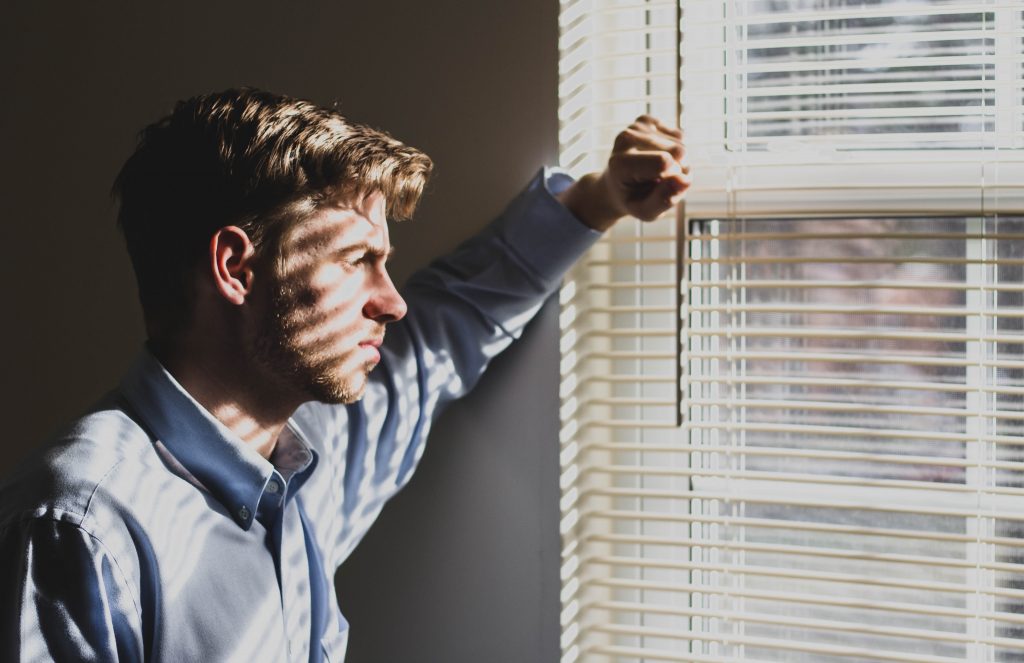How to deal with fear in this corona crisis?
The human brain is programmed to detect danger. In prehistoric times, it was vitally important to notice a dangerous animal or a hostile human on time and to react quickly to a potentially dangerous situation. Although we live in a much safer environment these days, our brain’s software hasn’t changed much. Negative news has a greater impact, gets more attention and is remembered better than positive messages. This is also what is happening with reporting about the coronavirus. In this blog, I would like to discuss insights from psychology that can help to use fear, in these stressful times, in a functional way and to avoid panic reactions.
Use fear in a functional way, but beware of doom-mongering
Fear helps us take the coronavirus seriously. A certain degree of fear is necessary to ensure that the advice given by the World Health Organization (WHO), national experts or local governments is followed. In the situation we find ourselves now, this is literally of vital importance. On the other hand, we shouldn’t go overboard and let ourselves be swept away by a wave of negativity. And that chance is fairly real, because our brain tends to weigh negative news too heavily. This tendency is further fuelled by journalism, which traditionally focuses on the bad stuff. Particularly in these dark times, it is important to continue seeing the rays of hope. Because if we don’t, it could be at the expense of our mental health, causing anxiety disorders or depression.
The negativity bias
If you ask test subjects whether they are prepared to undergo surgery, the chances of them agreeing to it are much higher when they are told they have a 70% chance of survival, than when they are informed that there is a 30% chance of dying. In psychology, this effect is described as the ‘negativity bias’. The tendency of our brain to weigh negative information more heavily has significant implications for our daily lives and for the way our society is organised. Because of the negativity bias, journalism is mainly focused on negative reporting and organisations are mostly geared towards preventing problems. It’s something we’re part of ourselves: we lie awake at night because of a quarrel, a problem or a threat. Most of the good things we experience go over our heads, slip away from us and don’t really sink in properly. In Europe we find it perfectly normal that we have food to eat every day, can go on holiday every year and have been living in peace for 75 years. Until something disruptive happens, like the current corona crisis. Then we long for a return to the normal situation, and the issues we used to worry about suddenly become insignificant. Our brain has detected a much greater danger, and this is now the priority. Rightly so.

Fear as an instrument
The government sometimes uses fear as an instrument. That sounds manipulative, but in certain situations it is clearly justified. After all, it can serve a good cause – protecting the population from danger, for instance. The government does this more often. Frightening pictures of black lungs on cigarette packets and posters of limbs mutilated by fireworks are examples of this in the Netherlands. It is sometimes useful to stir up fear, because otherwise the danger of smoking and playing with fireworks is underestimated. Similarly, in this corona crisis, it makes sense to use fear as a weapon. It is used to prevent something worse. If people change their behaviour as a result, hospitals are less stretched and human lives are saved.
But why stir up fear if we tend to weigh negativity more heavily anyway? The problem is that our brain not only has a negativity bias, it also has many other deviations. One of the things we suffer from is self-overestimation (‘it won’t happen to me’) and short-term fixation (‘meeting friends now is more important than the risk of becoming ill later’). These effects neutralise, as it were, the negativity bias. By further fuelling the fear, making it topical and personal, more people will exhibit the desired behaviour. At times, using psychological mechanisms of this kind is warranted. The end justifies the means. However, it is important to also arm people against possible side effects. Fear can easily go too far.
Avoiding doom-mongering
A healthy dose of anxiety during a pandemic is useful and even necessary. As long as it ensures that people stay at home as much as possible, do not shake hands and keep their distance, fear has a function. Doom-mongering, however, must be avoided at all times. Coming up with the worst-case scenarios is important for virologists, planners and policymakers, but it is not wise to continuously search for this kind of information yourself. Despite the fact that our brain does have that tendency. Compare it with our calorie requirements. Our brains would love to keep us eating all day. We don’t give in because we know it’s not good for our health. We have to look at our tendency to search out negative reporting in the same way. It would be good if journalists were to take their responsibility here as well. They could take an example from constructive journalism, a form of journalism that has crossed over from Denmark and focuses on providing balanced reporting. It pays attention to both the negative and positive aspects of a news item. The hospitals are full, but there is also unprecedented cooperation and creativity. Name the number of victims, but also the number of people who have recovered. There are plenty of positive things to report. But you don’t see this if you only read the headlines; then virtually the only thing fired at you is misery, and this generally paints an overly negative picture of reality. These headlines are meant to attract attention, and sell newspapers, and that just happens to work best with drama and danger. However, it also encourages doom-mongering, and it makes us feel despondent and hopeless.

The difference between hope and false hope
It is, especially now, so important to have hope and trust. The spread of the coronavirus is a crisis of enormous proportions. But there’s also sufficient reason to be hopeful. Pharmaceutical experts are working long and hard on medical solutions. Never before have scientists worked together so intensively, and they are now digitally connected. Most of us have never experienced such a crisis before, but neither have people ever collaborated on such a large scale. It is not possible to give a date on which we will have definite control of the coronavirus. That would give false hope. But we can certainly be hopeful.
And there are more positives to report. Tens of thousands of people have volunteered to help in the healthcare system. Many of them worked in the field in the past and are now working in another sector or are retired. All these people are willing to take risks themselves to help others. People are setting up websites for those needing help, and on social media people are offering to help their neighbours on a massive scale. The help offered exceeds demand many times over. By also paying attention to these hopeful and positive developments, we get a more realistic picture and can avoid descending into doom and gloom. Here are 10 tips, 1 tip to use fear and 9 to avoid doom and gloom.
10 tips to embrace fear, avoid anxiety and keep hope alive.
- If some people around you are being reckless, emphasise the dangers.
- If some people around you are anxious, emphasise the hopeful developments.
- Avoid reading headlines. Instead, read background articles.
- Limit your news consumption. For example, follow the news twice a day at a fixed time.
- At least two hours before you go to sleep, shift focus to another, more lightweight, subject.
- Think consciously about a few positive developments or good moments before you go to sleep.
- Don’t start with the news in the morning, have a relaxed breakfast first.
- Meditate for 10 minutes every day. This helps you gain control over your thoughts.
- Avoid dark thoughts about the future. Keep it small. Think mainly about the things you plan to do on that particular day.
- Make sure you have a good daily rhythm, eat well and exercise sufficiently.

Finally
It is important to follow the advice from medical specialists and the WHO. It’s better to be careful than pig-headed. If we feel anxious and concerned we should accept these feelings, because it is only logical and even necessary. But at the same time it is important that we don’t talk each other into a feeling of despair. Finding the balance is tricky. We’ll probably have to try and find it again and again. It’s a precarious balancing act, for both governments and each of us individually. Governments can use fear as an instrument while ensuring that paranoia does not arise. In the same way, we must protect ourselves and our loved ones from danger while remaining hopeful and helping others to be courageous. If we do that, we will weather the storm and get through this crisis together. Possibly stronger than ever.
Rijn Vogelaar is a Social Psychologist and is carrying out research at the Faculty of Social Sciences at Leiden University. He is the author of the book Fighting Negativity; how positivity can win the battle against negativity in our brain, our work and society as a whole.
More information about Fighting Negativity and other books can be found here:
Photo person on table by Jonathan Fink on Unsplash
Photo guy at window by Ethan Sykes on Unsplash
Photo person with blue sweater by Christian Erfurt on Unsplash
Photo horizon by Marc-Olivier Jodoin on Unsplash
